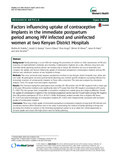Factors influencing uptake of contraceptive implants in the immediate postpartum period among HIV infected and uninfected women at two Kenyan District Hospitals.

View/
Date
2015Author
Shabiby, MM
Karanja, JG
Odawa, F
Kosgei, R
Kibore, MW
Kiarie, JN
Kinuthia, J
Language
enMetadata
Show full item recordAbstract
BACKGROUND:
Family planning is a cost effective strategy for prevention of mother to child transmission of HIV and reduction of maternal/infant morbidity and mortality. Contraceptive implants are a safe, effective, long term and reversible family planning method whose use remains low in Kenya. We therefore set out to determine and compare the uptake, and factors influencing uptake of immediate postpartum contraceptive implants among HIV infected and uninfected women at two hospitals in Kenya.
METHODS:
This cross sectional study targeted postpartum mothers at two Kenyan district hospitals (one urban and one rural). All participants received general family planning and method specific (Implant) counseling followed by immediate insertion of contraceptive implants to those who consented. The data was analyzed by descriptive analysis, T-test, Chi square tests and logistic regression.
RESULTS:
One hundred eighty-five participants were enrolled (91 HIV positive and 94 HIV negative) with a mean age of 26 years. HIV positive mothers were significantly older (27.5 years) than their HIV negative counterparts (24.5 years), P = 0.001. The two groups were comparable in education, employment, marital status and religious affiliation. Overall, the uptake of contraceptive implants in the immediate postpartum period was 50.3% and higher among HIV negative than HIV positive participants (57% vs. 43%, P = 0.046). Multivariate analysis revealed that a negative HIV status (P = 0.017) and prior knowledge of contraceptive implants (P = 0.001) were independently associated with increased uptake of contraceptive implants.
CONCLUSION:
There was a high uptake of immediate postpartum contraceptive implants among both HIV infected and un-infected women; efforts therefore need to be made in promoting this method of family planning in Kenya and providing this method to women in the immediate postpartum period so as to utilize this critical opportunity to increase uptake and reduce the high unmet need for family planning
Citation
BMC Womens Health. 2015 Aug 19;15:62.Publisher
University of Nairobi
Collections
- Faculty of Health Sciences (FHS) [10415]
